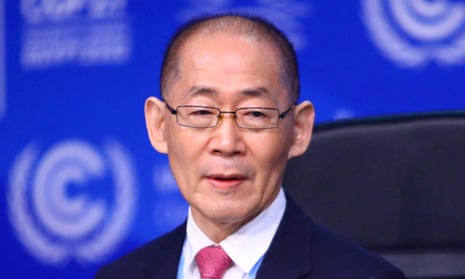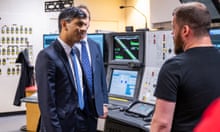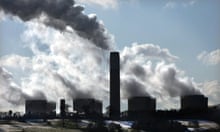Over-reliance on carbon capture and storage technology could lead the world to surpass climate tipping points, the head of the world’s climate science authority has warned.
Hoesung Lee, chair of the Intergovernmental Panel on Climate Change, said using technologies that capture carbon dioxide or remove it from the atmosphere was “no free lunch” and that countries should be wary.
Lee noted that the IPCC had found it was likely that global temperatures could rise by more than 1.5C above pre-industrial levels but could then be made to return to below 1.5C by the end of the century. “The jargon for that is the overshoot,” he said. “Carbon dioxide removal methods will be much in demand if that overshoot indeed occurs.”
“But there will be a cost to doing that. There’s no free lunch. And that cost includes that the longer the period of overshoot, there will be additional global warming, and there will be consequences of increased warming. There is also the possibility of positive feedback from that additional warming, creating more losses and damages during the overshoot period,” he warned. “So one wishes to avoid such an overshoot scenario.”
The IPCC warned in its latest comprehensive report on climate science, published in three parts from 2021 to 2022 with a fourth summary chapter delivered in March, that it was “now or never” to take action on emissions, if the world was to have a chance of avoiding the worst ravages of climate breakdown.
Governments must make their own decisions on whether to use carbon capture and storage technology, Lee said, as the IPCC advised only on science, and was neutral on policy. “CCS technologies are all part of the solutions,” he told the Guardian in an interview, at in Bonn, where preparatory talks for the Cop28 UN climate summit are taking place this week and next. “The way to stay within the carbon budget is that [high-carbon] infrastructures should be equipped with some measures of emissions reductions. Our report very clearly indicates that unabated fossil fuels has to be changed, with some measures that can reduce carbon emissions.”
Some representatives of fossil fuel interests have been arguing that the latest IPCC report justifies their continued production of oil and gas, citing a finding that a small amount of oil and gas production in 2050 was compatible with the need to reach net zero greenhouse gas emissions by that date.
But one IPCC author told the Guardian that while the IPCC had found some oil and gas could still be produced in 2050, while sticking to the 1.5C limit, fossil fuel producers should not conclude from this that they could keep operating. “We need to reduce fossil fuels drastically,” the author said.
Mark Maslin, professor of earth system science at University College London, said: “Just because there is an understanding that complete removal of fossil fuel use would be almost impossible in this century is no justification to expand production. When we are aiming of a global net zero emission world by 2050 – this means no new fossil production now, halving production over the next 10 years and reducing it as close to zero as possible by 2050. None of this in any way justifies countries expanding their fossil fuel production and to use the IPCC as an excuse is dishonest and a misuse of the science.”
Prof Michael Mann, climatologist at the University of Pennsylvania, told the Guardian that oil producers were misrepresenting the IPCC’s findings if they argued for a continued use of fossil fuels. “The IPCC doesn’t weigh in what energy sources will or will not be needed decades from now. While low levels of carbon emissions could be offset with negative emissions technology by 2050, there is no room in such scenarios for substantive reliance on oil, gas, or coal decades from now if we are to achieve the necessary reductions.”
after newsletter promotion
Lee responded: “I have noticed that, in the past, various people cite the IPCC in a way that suits their needs, for unknown purposes. However, our report is a public document, produced by experts, and through numerous independent scientific reviews. Decision makers have their own independent judgements for their own policymaking. We provide the science.”
Lee will step down as chair of the IPCC in late July, when a new chair will be chosen from four candidates, two of whom are women.








